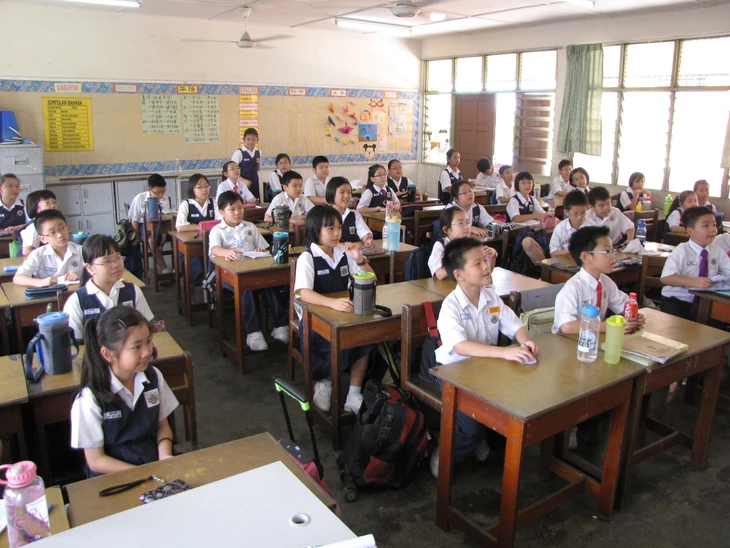
An English class in Malaysia - Photo: MALAYSIA MAIL
The Ho Chi Minh City Departmentof Education and Training's survey of foreign language proficiency (English) for 73,000 teachers across Ho Chi Minh City is attracting much public attention.
Looking around the world , many countries have been taking steps to improve the English standards of their native teachers.
Tighten English standards for teachers through exams
Malaysia has adopted the Malaysian University English Test (MUET) as a key tool to standardize teacher competencies, in conjunction with the roadmap to adopt the Common European Framework of Reference for Languages (CEFR) into the national education system.
MUET assesses four skills: listening, speaking, reading and writing, with a maximum total score of 360, divided from Band 1 to Band 5+. English teachers must achieve a minimum of Band 5, equivalent to level C1 according to CEFR.
For under-qualified teachers, the Malaysian Ministry of Education offers free refresher courses such as intensive English courses at universities, online learning materials and the Pro-ELT initiative to develop their language skills and teaching expertise.
At the same time, Malaysia also applies CEFR standards to determine English proficiency for teachers at all levels, and at the same time implements the British Council's APTIS for Teachers test to assess practical teaching skills.
However, these projects have also received mixed reviews. Many teachers say that this method is costly but does not bring practical results.
In Singapore, the National Institute of Education (NIE) at Nanyang Technological University (NTU) offers a certificate program, "Certificate in English Language Subject Content Knowledge for Teachers (Basic Level)", for teachers with at least two years of teaching experience but who have not majored in English at university level.
The program lasts 117 hours and focuses on three modules: language studies, phonology, vocabulary, grammar, and general language skills. Teachers need to be nominated by their principals to participate, to ensure quality selection.
Meanwhile, in Indonesia, the "Jakarta English Language Teacher Training Program (J-ELTT)" program was implemented from October 2021 to May 2023, sponsored by World Learning in collaboration with the US Embassy, to improve English skills for teachers at Indonesian Islamic schools.
J-ELTT includes two online courses such as "English for Teaching" and "Professional Knowledge for English Language Teachers" and Peer Learning Hubs for teachers to self-study and exchange experiences.
As a result, the program has trained 14 researchers, 56 teacher trainers and 280 Islamic school teachers, and built a sustainable nationwide professional support network.
Creating a widespread bilingual environment
From 2021, Taiwan launched a bilingual education development plan until 2030, aiming to enhance English proficiency for all people, especially in the education system.
According to the plan, Taiwan will invest NT$930 million in primary schools and NT$600 million in universities to establish bilingual teaching environments. The goal is that by 2030, 33% of schools will have bilingual classes in addition to English.
Taiwan also focuses on training non-native English teachers, establishing bilingual learning centers and recruiting 300 foreign English teachers to assist in teaching.
Meanwhile, Chile focuses on student learning. Since 2003, Chile has implemented the "English Opens Doors" (Programa Inglés Abre Puertas) program to improve the English proficiency of students in grades 5 to 12 in public schools, with support from the United Nations Development Programme (UNDP).
The program focuses on professional development for English teachers through training courses, workshops, English summer and winter camps, speech and spelling competitions, and provides scholarships for students majoring in English language teaching.
In addition, the National Volunteer Center within the program has attracted more than 2,100 native volunteers from around the world to assist in teaching English in public schools in Chile.
Source: https://tuoitre.vn/cac-nuoc-nang-chuan-tieng-anh-cho-giao-vien-ra-sao-20250426144159699.htm


![[Photo] 12th grade students say goodbye at the closing ceremony, preparing to embark on a new journey](https://vphoto.vietnam.vn/thumb/1200x675/vietnam/resource/IMAGE/2025/5/28/42ac3d300d214e7b8db4a03feeed3f6a)
![[Photo] Vietnamese and Hungarian leaders attend the opening of the exhibition by photographer Bozoky Dezso](https://vphoto.vietnam.vn/thumb/1200x675/vietnam/resource/IMAGE/2025/5/28/b478be84f13042aebc74e077c4756e4b)

![[Photo] General Secretary To Lam works with the Central Policy and Strategy Committee](https://vphoto.vietnam.vn/thumb/1200x675/vietnam/resource/IMAGE/2025/5/28/7b31a656d8a148d4b7e7ca66463a6894)
![[Photo] Prime Minister Pham Minh Chinh receives a bipartisan delegation of US House of Representatives](https://vphoto.vietnam.vn/thumb/1200x675/vietnam/resource/IMAGE/2025/5/28/468e61546b664d3f98dc75f6a3c2c880)


















































































Comment (0)